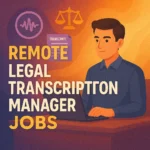Remote Family Law Transcriptionist
Description
Frequently Asked Questions (FAQs)
1. What kinds of materials does a Family Law Transcriptionist typically work with?
A Family Law Transcriptionist primarily converts legal audio recordings into written text, including proceedings related to custody arrangements, divorce settlements, adoption hearings, and attorney-client consultations. These documents often cover sensitive topics, requiring a high level of discretion and precision.
2. How does this role support the legal workflow in family law cases?
Transcriptionists play a crucial role in delivering accurate legal records that attorneys and courts rely on during litigation. These written transcripts ensure that verbal testimonies and legal discussions are available in a usable format for case preparation, judicial review, and legal filings.
3. What common difficulties can arise in transcribing family law content, and
Challenges may include unclear audio, multiple speakers, strong accents, and legal jargon. These issues are addressed through the use of advanced transcription software, careful listening techniques, and collaboration with legal professionals for clarification when needed.
4. What qualifications or expertise can give applicants an advantage in this position?
Candidates with legal transcription training or court reporting certification stand out. Prior experience in a legal setting, especially within family law, and proficiency with legal formatting and terminology also enhance one’s qualifications. Familiarity with relevant software tools and legal citation practices adds further value.
5. How does this position support work-life balance and flexibility?
This role allows professionals to set their own working hours while meeting project deadlines, making it highly adaptable to personal schedules. With no in-person commitments or unexpected overtime, transcriptionists can maintain a consistent work-life rhythm while contributing to meaningful legal outcomes.




